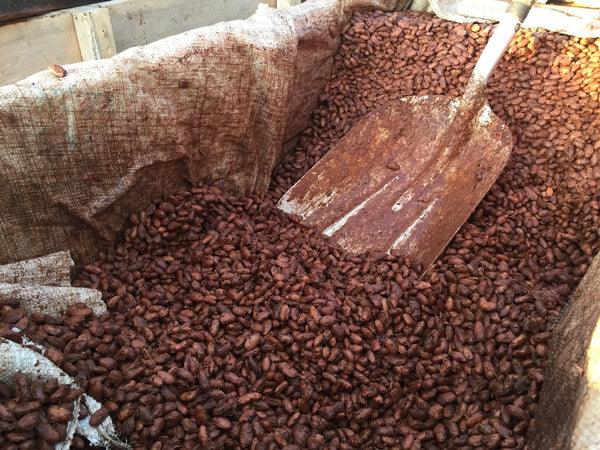Hershey Avoids Paying New Living Wage Premiums For Cacao
Nov 25, 2020
The Hershey Company, as one of the biggest chocolate companies in the world, impacts the chocolate market with everything they do. The company has for years said that it supports its mostly-impoverished cacao growers in making a living wage, yet a recent action contradicts that stance.
Hershey sources much of its cocoa from Ghana and Ivory Coast, which together produce about 70% of the world’s cocoa. The governments of those two countries last fall created a Living Income Differential (LID) of $400/ton to be added to the price of the beans starting with this year’s harvest which began in October. The premium was designed to benefit the farmers. So Hershey should be paying more for its beans to meet this requirement — which the company is on record as saying it supports. Instead, the company circumvented the premium by buying a massive quantity of cacao beans on the futures market. The enormous purchase caused a record spike in cocoa prices that other companies will have to pay.
What the Hershey Company did is perfectly legal, and many people would even say it’s smart. They got a great deal and caused their competitors to get a much worse deal. Perhaps the higher price that other companies will pay (at least temporarily) will benefit the cacao farmers to some degree. But it seems to us at Tangle that the people who got the worst deal of all are, once again, the farmers.
Consumers have been demanding better treatment of farmers and and end to child labor in the cocoa industry ever since 2000 when reports of child slavery and trafficking emerged. In the US in 2001, Senator Tom Harkin and Representative Eliot Engel co-sponsored the Harkin-Engel Protocol, an international agreement entered into by almost all major industry players, including Hershey. However, the deadline for the chocolate companies to meet the standards in the Harkin-Engel Protocol has been extended several times; as of this writing, those standards have still not been met.
Chocolate companies do feel the pressure from their customers to behave ethically. And this can be used to try to keep the companies in line. For example, this month the Ghana Cocoa Board Chief Executive Officer Joseph Boahen Aidoo said that he is prepared to “name and shame” the companies that aren’t following through with their promises, including to pay the LID premium.
As a micro-business among many other small craft chocolate companies, events like this one make us at Tangle Chocolate feel even better about what we do. The craft chocolate industry couldn’t be more different from the mass commodity chocolate industry. Most of us choose carefully from whom we buy our cacao beans to make sure that both the farmers and the environment are treated well; many of us have visited the farmers who grow the beans in order to be better business partners with them; many of us are committed to educating the general public about the chocolate industry so that people will understand the true cost of top-quality chocolate and be willing to pay for it. If issues like these are important to you, we urge you to contact your favorite chocolate company and talk to them. There are plenty of us out there who will be happy to pick up the phone.
https://www.dol.gov/sites/dolgov/files/ILAB/legacy/files/GhanaSignedDeclaration.pdf
https://www.dol.gov/sites/dolgov/files/ILAB/legacy/files/Harkin_Engel_Protocol.pdf


